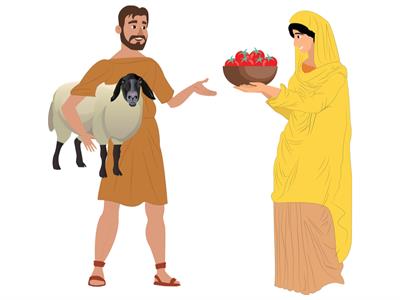
PUMPA - SMART LEARNING
எங்கள் ஆசிரியர்களுடன் 1-ஆன்-1 ஆலோசனை நேரத்தைப் பெறுங்கள். டாப்பர் ஆவதற்கு நாங்கள் பயிற்சி அளிப்போம்
Book Free DemoHello students, you must know what money is and its importance in day today world. In this chapter, we will learn about the history of money and its various forms. Modern forms of money are linked to the banking system.
Money has eased the day to day transactions, valuing goods and services and has allowed us to store the wealth and trade in future. Money, in some form, has been part of human history for atleast the last 3000 years. However, before the invention of money, a system of bartering was used in the past.
Evolution of Money:
The word Money is derived from the Roman word “Moneta Juno”. It is the roman goddesses and the republic money of the roman empire. The Indian rupee is derived from the Sanskrit word ‘Rupya’, which means silver coin.
The word Money is derived from the Roman word “Moneta Juno”. It is the roman goddesses and the republic money of the roman empire. The Indian rupee is derived from the Sanskrit word ‘Rupya’, which means silver coin.
There are many stages of the evolution of money. The earliest and primitive stage is the Barter system.
Barter system:
Barter system is exchanging goods for goods without the use of money in the primitive stage. People exchanged services and goods for other services and goods in return. The value of bartering items can be negotiated with the other party. Bartering doesn’t involve money which is one of the advantages.

Barter system
Hence Barter system had many deficiencies like,
1. Lack of double coincidence of wants - The phrase 'double coincidence of wants' means that what one person wants to buy is exactly what the other person wants to sell. In the barter system, this is not fulfiled.
2. Common measure of value - The value of goods exchanged cannot be of equal value always.
3. Indivisibility of commodities - The commodities exchanged may not be divided or traded equally.
4. Difficulties of storing wealth.
1. Lack of double coincidence of wants - The phrase 'double coincidence of wants' means that what one person wants to buy is exactly what the other person wants to sell. In the barter system, this is not fulfiled.
2. Common measure of value - The value of goods exchanged cannot be of equal value always.
3. Indivisibility of commodities - The commodities exchanged may not be divided or traded equally.
4. Difficulties of storing wealth.